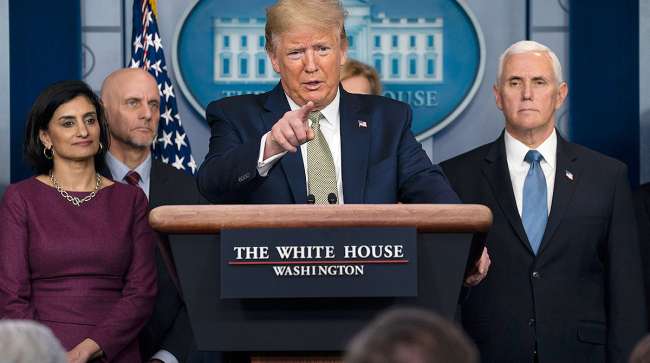Senior Reporter
Trump: ‘I Hope Very Soon’ Country Returns to Normalcy

[Stay on top of transportation news: Get TTNews in your inbox.]
Days after not ruling out a nationwide lockdown to mitigate the spread of the coronavirus, President Donald Trump did not specify when the country would return to a sense of normalcy.
“I hope very soon. We’ll see. This is uncharted territory, as you know. We think we have ideas. Does it help to say what the ideas are? I hope very soon,” Trump told reporters at the White House on March 19.
Recent disruptions across every aspect of society nationwide have forced people to change or adjust their routines. Government officials at the federal, state and municipal levels are urging residents to distance themselves socially and to mostly avoid public areas. A few cities and states have issued strict social-distancing guidelines for the next several weeks.
Countries, such as Italy and France, have imposed strict lockdowns on mobility to reduce the spread of the virus. The United States recently announced nonessential travel restrictions with Canada.
We are continuing the work with health care providers, businesses, and state leaders to identify available supplies across the federal stockpile and the private sector so that we can protect our amazing health care workers who are taking care of patients with the Coronavirus. pic.twitter.com/VEdUgQcECt — Mike Pence (@Mike_Pence) March 19, 2020
“We’ve pulled together as a nation. People are, for the most part, doing what they’re supposed to be doing. The social distancing is very interesting: a whole new term that’s become a hot; it’s become somewhat of a hot term. But people are listening, and they’re really doing a great job,” Trump said.
Trump also announced he directed the Food and Drug Administration to determine if an existing drug used to treat malaria would be suitable for treating the coronavirus. Health officials grapple with growing numbers of individuals testing positive, and they’re calling on governments to assist with medical supplies.
Trump had announced he would be invoking the Defense Production Act, meant to assist the private sector with increasing manufacturing and distribution of emergency medical equipment. On March 19, he clarified that he hoped relying on the Defense Production Act would not be necessary. As he put it, “The federal government is not supposed to be out there buying vast amounts of items and then shipping.”
President @realDonaldTrump is at @FEMA headquarters, speaking via teleconference with America's Governors on preparation, mitigation, and response to #COVID19. pic.twitter.com/rewPrAVm45 — The White House (@WhiteHouse) March 19, 2020
As part of the federal response, the president has not ruled out mobilizing the Army Corps of Engineers to set up emergency hospitals in states with growing numbers of cases. And, he left open the possibility of temporarily ordering a nationwide lockdown that would freeze most public activity.
“Hopefully, we are not going to need that. We think of everything. I mean, we have — every idea that you mentioned, we’ve thought of. And, you know, that’s a very big step. That’s a step that, I mean, in one sense would work. It’s a very big step. It’s something we talk about, but we haven’t decided to do that,” Trump told reporters March 17 regarding a lockdown. “I don’t think that’s a step that we’re going to be taking.”
The White House’s budget managers are meeting with congressional leaders to assist with a $1 trillion economic stimulus package meant to target sectors in contact with the supply chain. Aspects of the transportation and tourism industries, the service sector, and academia have been hit hard by the pandemic.
Markets have dropped sharply this month. On March 16, the Dow posted the worst single-day point drop in its history.
New market realities and a pandemic that has crippled mobility nationwide contributed to Trump’s altered messaging about the pandemic. After weeks minimizing the severity of the crisis and blaming perceived opponents for politicizing the crisis, the president on March 16 referred to the crisis as “a very bad one.”
“We have a problem that a month ago, nobody ever thought about. Nobody in the — you know, I’ve read about it. I read about — many years ago, 1917, 1918. I’ve seen all of the different — the different problems similar to this that we’ve had,” said Trump. “This is bad in the sense that it’s so contagious.”
Want more news? Listen to today's daily briefing:




